Villar - Knife Edge: Life as a Special Forces Surgeon
Here you can read online Villar - Knife Edge: Life as a Special Forces Surgeon full text of the book (entire story) in english for free. Download pdf and epub, get meaning, cover and reviews about this ebook. year: 1997,2012, publisher: Vineyard Press Ltd, genre: Religion. Description of the work, (preface) as well as reviews are available. Best literature library LitArk.com created for fans of good reading and offers a wide selection of genres:
Romance novel
Science fiction
Adventure
Detective
Science
History
Home and family
Prose
Art
Politics
Computer
Non-fiction
Religion
Business
Children
Humor
Choose a favorite category and find really read worthwhile books. Enjoy immersion in the world of imagination, feel the emotions of the characters or learn something new for yourself, make an fascinating discovery.
Knife Edge: Life as a Special Forces Surgeon: summary, description and annotation
We offer to read an annotation, description, summary or preface (depends on what the author of the book "Knife Edge: Life as a Special Forces Surgeon" wrote himself). If you haven't found the necessary information about the book — write in the comments, we will try to find it.
Richard Villar, guest of the BBCs Hospital Watch, is a world-famous surgeon. He is also a hero. For much of his career Richard Villar has worked with the SAS, in the developing world, and amidst conflict zones that include Lebanon, Bosnia, the Middle East, Northern Ireland and Central America. Knife Edge is his extraordinary true story.
Knife Edge: Life as a Special Forces Surgeon — read online for free the complete book (whole text) full work
Below is the text of the book, divided by pages. System saving the place of the last page read, allows you to conveniently read the book "Knife Edge: Life as a Special Forces Surgeon" online for free, without having to search again every time where you left off. Put a bookmark, and you can go to the page where you finished reading at any time.
Font size:
Interval:
Bookmark:
Life as a Special Forces Surgeon
By Richard Villar

To Louise, Ruairidh, Angus, Felicity
and
To those I could not save
Work with the Special Forces, and as a surgeon, makes me doubly restricted. Medical confidentiality and State secrecy are both vitally important. Lives do depend on them. Please therefore understand why I have chosen to fictionalize many names, change patterns of disease and injury, and alter place names, operational codenames and the like. How would you like your disease to appear in print? I wouldnt, and I imagine you would feel the same. Lean back now, relax, read on and enjoy yourself. There is a whole world of adventure out there.
Those who have written a book will understand what an enormous task it involves. Those who have not, may not. It has been a lifelong desire to write this and it would have been impossible without the help of so many individuals, particularly in a book that covers twelve countries, six major conflict zones, and a whole host more besides. Some have assisted without realizing it, perhaps by casual comment, others have given knowingly and willingly of their time. Owing to the books content, certain more secretive individuals have been delighted to assist, but would prefer not to be overtly associated with the end result. Having been in the same position, I understand their worries. As all of you are equally special to both me and the book, I have decided to acknowledge no one by name. Those who have helped, all seventy-three of you, will receive a signed copy on the day. You are each wonderful, brilliant in fact. I am indebted to you.
All photographs not credited are the property of the author .
Doc! Get over here! Someones been shot!
I could not believe it it had to be a joke. My first day as SAS medical officer and there had been a shooting. Was this really a taste of things to come?
The moment I reached the building, medical pack in hand, I realized this was no test, no trial run. The soldier lay there, blood pumping viciously from a massive wound in his buttock. He looked terrified. Still conscious, he glanced up at me imploringly. Ill be OK, Doc, wont I? Ill be OK?
I was on autopilot by then, mentally checking off the vital functions I had to perform to ensure the mans survival. Airway, breathing, circulation - airway, breathing, circulation, I whispered to myself. I muttered reassurance as best I could, unsure whether or not I could stop the bleeding. Uncertain which nerves, if any, the blast had destroyed.
It had been a shotgun, accidentally discharged six inches away. Most of the buttock was missing. What remained looked dirty, contaminated with grit and pieces of clothing. Around me stood several tall SAS operatives, each one totally relaxed. They had seen it before. A real-life situation it may be, but I was still on test. They inspected my every move. How will he do under stress? I could hear them thinking.
I tried hard to stop my hands shaking as I ripped open the shell dressing, stuffing it firmly in the wound. Lean on it! I instructed the medic who had joined me in my dash to the building. With enough pressure applied, I knew that any bleeding could be stopped. It was important not to lift up the shell dressing to see how things were doing. Keep on stuffing them in, one on top of the other, as hard as you can go, until the bleeding stops, I thought. I had seen many gunshot wounds before. My record had been fourteen dressings to stem the tide. This one needed three.
The soldier survived, thanks to both prompt treatment and his own strength. With a major artery ruptured it can take only thirty seconds to die. Life-saving must therefore be reflex. As a doctor you act first, think later and trust to God that your medical training keeps you right.
I delivered the man to hospital one hour later, an intravenous infusion running fast to replace the blood he had lost. Once the surgeons had taken him over I sat, exhausted, on a wooden bench in the hospital grounds. I felt shattered, both physically and emotionally. Join the SAS? It had seemed a good idea at the time.
I had always wanted to be a surgeon, from the moment my mother gave me a plastic stethoscope on my seventh birthday; I played with it until the toy was chipped and cracked beyond recognition. My only sister, six years my junior, would be exposed to all manner of imaginary operations, homemade splints and carefully applied bandages. For hours I would daydream and ponder, glued to any and every television programme or book that covered the subject. Was there really a breed of person who cut people open for a living? How did they do it? What actually happened during an operation? There had never been a surgeon in my family, even if I went back 300 years, so there was no close relative I could ask. The only exception was an uncle, a charming New Zealander living in South Wales, an eminent chest doctor. He had been decorated following his time as a prisoner of war in Greece and had endless stories of life as a doctor that filled me with passionate enthusiasm about the medical profession.
My father was a highly successful naval officer, having been a sailor since the age of thirteen. My mother, a part-time broadcaster and writer, would chase round the globe in his wake, supporting and holding her restless family together. A thousand times I remember being asked the question by any and every visitor to our various naval homes:
What do you want to be when youre older, Richard?
A surgeon, I would answer, steadfast in my determination.
A surgeon? My, thats interesting, would come the reply, followed by a friendly pat on my head. I soon realized that my ambition was a conversation-stopper. No one knew anything about surgery, so discussing it was impossible. I would have to find out for myself.
To be a surgeon, you have to become a doctor first, so throughout my schooling I concentrated on the sciences. Of all such subjects, biology was my favourite, particularly dissection. Dissection involves cutting open some poor animal to gain a better understanding of how the body works. In retrospect it seems cruel, but in those days I knew no better. You would take a small, unsuspecting frog and insert a needle forcibly into it, just below the base of its fragile skull. This would pith it, such that it was technically dead, or so we were told, but its heart would continue working. You could then cut it open to see how the tiny body functioned. There would beat the firm, pea-sized heart, pushing blood round the animals circulation. The guts would wriggle and writhe, driving the motions onwards. I was riveted by such things, particularly the act of opening the beast up with the tweezer-like surgical forceps and curved, tiny scissors. From a young age I learned that opening and closing bodies, however small, was not a simple act. It took time and effort to practise. If you were not careful, your scissors could slip and damage an artery or nerve. I learned to rest the edge of my hands on the table while dissecting, to eliminate any sign of tremor. I learned, too, that surgical errors can be fatal. It was with this background, and a now fierce determination to become a surgeon, that I entered my London medical school. I was damned sure what I wanted to be.
At medical school I was exposed to every aspect of doctoring imaginable: general practice, cancer therapy, childrens medicine, X-rays, the lot. One specialty, above all others, stood out for me - orthopaedics, the art of operating on bones and joints. I remember the day I decided it was for me. I had barely started my training and had been allocated a two-week period attached to an eminent orthopaedic surgeons practice. I was by myself in a huge, empty room containing little more than a wooden desk, two rickety plastic seats, and an X-ray viewing box screwed to a dirty wall. Decor has never featured highly on the National Health Services list of priorities. Outside I could hear the hubbub of conversation as dozens of patients waited to be seen, all comparing breaks and sprains, and the inconvenience of months spent in plaster. I sat nervously in my seat, jammed underneath the viewing box, awaiting the arrival of my consultant.
Font size:
Interval:
Bookmark:
Similar books «Knife Edge: Life as a Special Forces Surgeon»
Look at similar books to Knife Edge: Life as a Special Forces Surgeon. We have selected literature similar in name and meaning in the hope of providing readers with more options to find new, interesting, not yet read works.
Discussion, reviews of the book Knife Edge: Life as a Special Forces Surgeon and just readers' own opinions. Leave your comments, write what you think about the work, its meaning or the main characters. Specify what exactly you liked and what you didn't like, and why you think so.

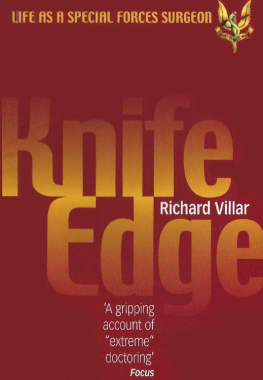
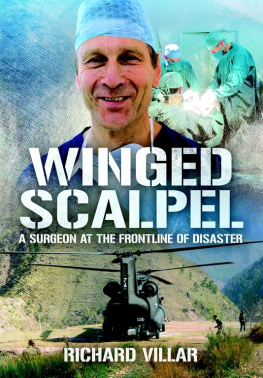
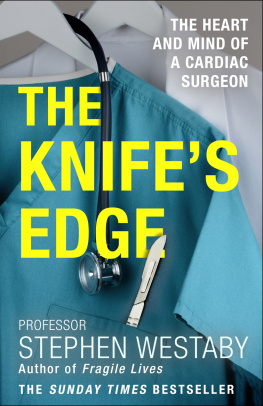
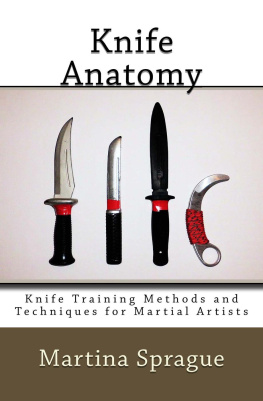
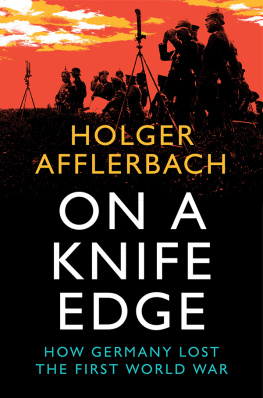
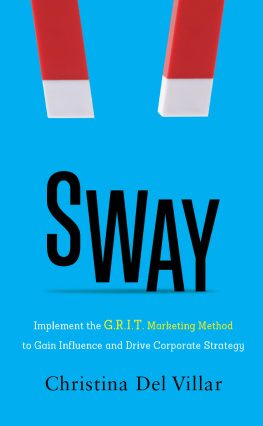

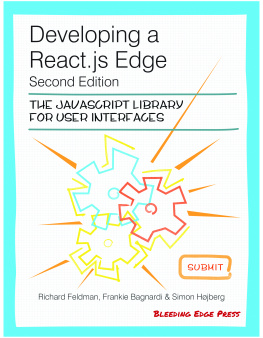

![Oliver Villar [Oliver Villar] - Learning Blender: A Hands-On Guide to Creating 3D Animated Character= s, Second Edition](/uploads/posts/book/124038/thumbs/oliver-villar-oliver-villar-learning-blender-a.jpg)
